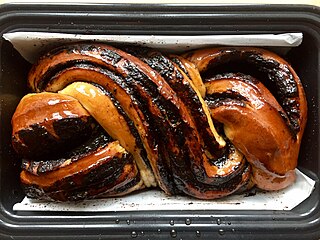
Marmite ( MAR-myte) is a British savoury food spread based on yeast extract, invented by the German scientist Justus von Liebig. It is made from by-products of beer brewing (lees) and is produced by the British company Unilever. Marmite is a vegan source of B vitamins, including supplemental vitamin B12. A traditional method of use is to spread it very thinly on buttered toast.

Pesto or more fully pesto alla genovese is a paste made of crushed garlic, pine nuts, salt, basil leaves, grated cheese such as Parmesan or pecorino sardo, and olive oil. It originated in the Italian city of Genoa, and is used to dress pasta and flavour genoese minestrone soup.

Annatto is an orange-red condiment and food coloring derived from the seeds of the achiote tree, native to tropical parts of the Americas. It is often used to impart a yellow to red-orange color to foods, but sometimes also for its flavor and aroma. Its scent is described as "slightly peppery with a hint of nutmeg" and flavor as "slightly nutty, sweet and peppery".

A tea sandwich is a small prepared sandwich meant to be eaten at afternoon teatime to stave off hunger until the main meal.

Liptauer is a spicy cheese spread from Slovak, Austrian and Hungarian cuisine. Liptauer is made with sheep milk cheese, goat cheese, quark, or cottage cheese.

Laguiole, sometimes called Tome de Laguiole, is a pressed uncooked French cheese from the plateau of Aubrac, situated at between 800 - 1400m, in the region of Aveyron in the southern part of France. It takes its name from the small town of Laguiole and has been protected under the French Appellation d'Origine Contrôlée (AOC) since 1961 and a Appellation d'origine protégée since 1996. Laguiole is said to have been invented at a monastery in the mountains of Aubrac in the 19th century. According to historical accounts, the monks passed down the recipe for making this cheese from cattle during the alpages to the local buronniers, the owners of burons, or mountain huts.

Cheese spread is a soft spreadable cheese or processed cheese product. Various additional ingredients are sometimes used, such as multiple cheeses, fruits, vegetables and meats, and many types of cheese spreads exist. Pasteurized process cheese spread is a type of cheese spread prepared using pasteurized processed cheese and other ingredients.
Canarian cuisine refers to the typical dishes and ingredients in the cuisine of the Canary Islands, and it constitutes an important element in the culture of its inhabitants. Its main features are the freshness, variety, simplicity, and richness of its ingredients, the mix of seafood and meat dishes, its cultural influences and the low knowledge of it by the rest of the world. Canarian cuisine is influenced by other cultures, especially that of the aboriginal inhabitants of the islands (Guanches), and has influenced Latin American cuisine.

Pimento cheese is a spread typically made of cheese, mayonnaise, and pimentos and is typically served on crackers and vegetables or in sandwiches.
Dairylea is a popular brand of processed cheese products produced by Mondelēz International and available in Ireland and the United Kingdom. As of 2017, it is also available in Australia.

Kalakand is a sweet cheese confection from India. It has been described as "akin to Italian cheesecake, firmer in texture than milk cake, but softer than burfis."

A savoury is the final course of a traditional English formal meal, following the sweet pudding or dessert course. The savoury is designed to "clear the palate" before the port, whisky or other digestif is served. It generally consists of rich, highly spiced or salty elements. While the popularity of savouries has waned since their height during Victorian times, there has recently been a renewed interest in savouries.

Quince cheese is a sweet and tart, thick jelly made of the pulp of the quince fruit. It is a common confection in several countries.

Ktipiti or htipiti, also known as tirokafteri or kopanisti, is a cheese-based spread from Greece.

Quesito is a cream cheese-filled pastry twist from Puerto Rico.

Khandvi, also known as Patuli, Dahivadi or Suralichi Vadi, is a savory snack in the Maharashtrian cuisine as well as in the Gujarati cuisine of India. It consists of yellowish, tightly rolled bite-sized pieces and is primarily made of gram flour and yogurt.

This is a list of prepared-foods list articles on Wikipedia.

A babka is a sweet braided bread which originated in the Jewish communities of Poland and Ukraine. It is popular in Israel and in the Jewish diaspora. It is prepared with a yeast-leavened dough that is rolled out and spread with a filling such as chocolate, cinnamon, fruit, or cheese, then rolled up and braided before baking.

















